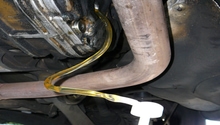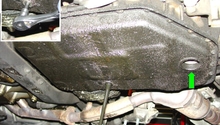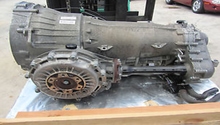Porsche 928: Should I Use Conventional or Synthetic Transmission Fluid?
It's a recurring debate, but what's important is that you at least know the facts. Here's what to consider when contemplating which transmission fluid to use.
This article applies to the Porsche 928 (1979-1995).
When it comes to the question of using synthetic or conventional transmission fluid, the answer depends on a car's specific situation. What's important is that you know how to identify what you should use in your own vehicle. For starters, it's good to know the basic differences between conventional and synthetic fluids. Conventional fluids, also sometimes referred to as mineral-based fluids, are fluids that are based mostly on refined crude oil supplies. Additives can be added to give them specific properties. Synthetic fluids are manufactured and, more importantly, formulated to meet very specific requirements and properties.
So which one is better than the other? It's not as easy as saying, "Just use synthetic because it will do everything you need it to." The best way to determine which one you should use is to first identify what you are looking to get out of these fluids and what the manufacturer recommends. Based on these factors, you can determine what will be best for your car.
Always remember: machines like consistency. The most important thing is to be consistent with your choice of lubricants and service intervals. If you have been using conventional fluids for years and have had no issues, it's probably a good idea to stay with conventional fluids. That doesn't mean you can't change, but always remember: if it isn't broke, don't fix it. Read more to learn about the differences between manual and automatic transmissions in regards to which transmission fluid should be used.
Which Fluid Should Be Used?
Manual Transmission
The fluid that a manual transmission requires is needed for a much different reason than that of an automatic transmission. The fluid in a manual transmission is essentially a gear oil that is used to lubricate the gears and other internal parts of the transmission. It is required for operation but only to keep things lubed and moving smoothly.
Most Porsche 928s require 75w90 GL-5 rated gear oil. The GL-5 rating tells us that the gear oil has passed specific tests and meets certain requirements. When selecting a gear oil for your 928, it is very important that you stick to gear oils that have this rating.
It has been claimed by many gear oil manufacturers that synthetic gear oils will last longer and give you longer service intervals. In the long run, this should save you money, even though synthetic gear oils often cost a bit more. Some owners of 928s have even claimed that when they switched to synthetic gear oils, their transmission shifted smoother. If you are just driving your car around leisurely and not being very hard on it, then conventional gear oils would be just fine. If you are a regular track driver with your 928, then synthetic would be the better way to go. Again, when it comes to gear oils, it's more a matter of being consistent with your fluid choice and service intervals. If you have been using conventional in your transmission and haven't had any issues, then keep using conventional. Your gains from switching to synthetic aren't going to be that noticeable.

Automatic Transmission
Compared to a manual transmission, the fluid requirements of an automatic transmission are a much different beast. An automatic transmission is essentially a hydraulic unit that needs fluid in order to function. While a manual transmission would still function without fluid, at least for a short while, the automatic transmission just wouldn't even work. That's because the fluid is needed for not only lubrication and to keep things cool, but also to run the various components that are part of the automatic transmission. We won't get into operating specifics because that's a whole other option in itself, but let's just say that the list of requirements when it comes to automatic transmission fluid is very lengthy. Deciding between whether to run conventional or synthetic fluid is probably more crucial.
There are a number of synthetic fluids on the market by some big companies. There are even semi-synthetic fluids. This is why, when it comes to automatic transmission fluid, it really pays to do your research. Most companies that manufacture synthetic fluids will have Technical Data sheets on their websites. They will go over the properties, requirements, and general operating characteristics that their fluid is designed for.
The most important thing is that you match the characteristics and requirements of your automatic transmission with the properties and requirements of your fluid. Most conventional and synthetic fluids these days are compatible, but not all fluids are the same. Some are made with such things as friction modifiers, and some are not. Some have certain additives, and some don't. The manufacturer of your transmission knew, when it was designed, what specific kind of fluid it would need and what was required from a fluid. That is why you will see a certain fluid recommendation when you look in your service manual. It's very critical to the operation of your transmission to stick with a fluid that can deliver on these requirements.
Related Discussions
- Synthetic Versus Conventional ATF - Rennlist.com
- Lubricants for the Porsche 928 - Rennlist.com
- Which ATF to Use - Rennlist.com






